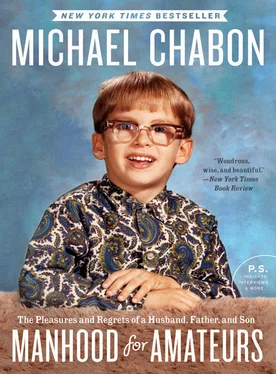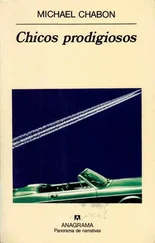Michael Chabon - Manhood for Amateurs
Здесь есть возможность читать онлайн «Michael Chabon - Manhood for Amateurs» — ознакомительный отрывок электронной книги совершенно бесплатно, а после прочтения отрывка купить полную версию. В некоторых случаях можно слушать аудио, скачать через торрент в формате fb2 и присутствует краткое содержание. Год выпуска: 2010, Издательство: Harper Perennial, Жанр: Биографии и Мемуары, Публицистика, на английском языке. Описание произведения, (предисловие) а так же отзывы посетителей доступны на портале библиотеки ЛибКат.
- Название:Manhood for Amateurs
- Автор:
- Издательство:Harper Perennial
- Жанр:
- Год:2010
- ISBN:нет данных
- Рейтинг книги:4 / 5. Голосов: 1
-
Избранное:Добавить в избранное
- Отзывы:
-
Ваша оценка:
- 80
- 1
- 2
- 3
- 4
- 5
Manhood for Amateurs: краткое содержание, описание и аннотация
Предлагаем к чтению аннотацию, описание, краткое содержание или предисловие (зависит от того, что написал сам автор книги «Manhood for Amateurs»). Если вы не нашли необходимую информацию о книге — напишите в комментариях, мы постараемся отыскать её.
is the first sustained work of personal writing from Pulitzer Prize-winning author Michael Chabon. In these insightful, provocative, slyly interlinked essays, one of our most brilliant and humane writers addresses with his characteristic warmth and lyric wit the all-important question: What does it mean to be a man today?
Manhood for Amateurs — читать онлайн ознакомительный отрывок
Ниже представлен текст книги, разбитый по страницам. Система сохранения места последней прочитанной страницы, позволяет с удобством читать онлайн бесплатно книгу «Manhood for Amateurs», без необходимости каждый раз заново искать на чём Вы остановились. Поставьте закладку, и сможете в любой момент перейти на страницу, на которой закончили чтение.
Интервал:
Закладка:
I was walking past a public elementary school off Solano Avenue a few weeks ago and noticed, hanging over its entrance, a large paper banner decorated in orange and black, featuring a motif of jack-o’-lanterns and scarecrows and proclaiming the imminent observation by its students of the school’s annual Harvest Festival at the end of October. The sign, like the other elements of decor hung from the gates of the schoolyard, said nothing about Halloween. There was no imagery of ghosts, bats, witches, haunted houses, etc., but I noticed that aside from the pumpkins and the scarecrows, there was nothing in the way of agricultural or other harvesttime imagery, either — no haystacks or, I don’t know, ripened ears of maize, cornucopias, sickles, threshing machines, ritual stonings. Apart from the gardens in its backyards — lavish as many of those are — and the bounty of hydroponic plantations in its closets and basements, Berkeley, California, has, as far as I know, no harvest to be observed. I wondered whose sensibilities were being respected by this absurd bit of subterfuge or, if you prefer, cultural sensitivity. Perhaps those of evangelical Christians who have been known to object to the historical association of the eve of All Saints’ Day with witches, devils, and other characters one would have imagined might fall beneath the contempt of a truly effective personal savior, at least when depicted in crepe paper, latex, and cake frosting. Or maybe it was, paradoxically, non-Christians whose feelings were being respected, given the connection between Halloween and the ancient Catholic feast of All Hallows. Or maybe the decision to rebrand and denature Halloween had been made out of respect for, though without recourse to any observable facts about or even a passing knowledge of, the feelings of small children. But mostly, I wondered, Who the hell do the people who authorized that sign and that “festival” think they’re kidding ?
I’m not saying that school districts — or anybody else, for that matter — ought to go around scaring people without their consent, or that disrespecting people’s feelings ought to be any public institution’s official policy, though I think I could make an argument for the latter in certain cases, such as that of people who see grave moral danger in an eight-year-old wearing a bedsheet. I don’t think public schools should impose Christian worship on anybody, least of all Christians. I don’t want my children taught that it’s all right to persecute or demean others for their beliefs or, for that matter, that on October 31 the souls of the damned rise up from their graves to go carousing with the Prince of Evil. But if had a choice, I might pick either of those over teaching them that it’s our unavoidable lot as modern humans to dwell everlastingly, wearing an eternal smirk of knowingness, in bullshit.
The same thing goes for Christmas and the by now ubiquitous school holiday or winter pageant. I am a liberal agnostic empiricist, proud to be a semi-observant, bacon-eating Jew, and I have only contempt for the intolerance, ignorance, anti-intellectualism, self-deception, implicit violence, and misogyny that underlie religious fundamentalism of every flavor, from bearded to clean-cut. But I’m all for putting the Christ back in Christmas, and not only in the hope, doubtless in vain, that it might shut a few evangelical Christians up. It pains me to say it, but the people who argue that it’s dishonest to equate Christmas, Hanukkah, and Kwanzaa are, at least in this instance, and with very little in the way of percentage gain in their own overall level of honesty or correctness, correct. I like to eat latkes as much as the next Jew, and candlelight is lovely, but the glorification of Hanukkah by American Jews is another example of voluntary group self-deception. It’s an exercise in collective bad faith in which everyone agrees to ignore what everyone knows to be true: that Hanukkah is a pissant holiday elevated beyond its station and intrinsic meaning for the gratification of toy manufacturers, greeting-card companies, and the makers of chocolate coins wrapped in gold foil, in an effort to battle the cultural stranglehold of Christmas, an effort that has never been and never will be successful, if only because Hanukkah songs are so painfully lame. As for Kwanzaa, I can’t say for sure, but I see no compelling reason to give it the benefit of the doubt. Christmas is a big deal, a much bigger deal than Hanukkah or Kwanzaa or any other Christian holiday, for that matter, apart from Easter. So, fine, let’s put the Christ back in it or get rid of Christmas entirely. Either way, let’s do it honestly, which, if we are fundamentalists, means throwing out Santa Claus, candy canes, and mistletoe, not to mention decorated trees, light-up life-size plastic reindeer, and the entire Christmas economy itself.
Thank God, though, we are not fundamentalists. And maybe there’s a way we can keep Christmas, Christ and all, and still respect and acknowledge both the traditions of non-Christians and the First Amendment of the Constitution. Because I would kind of hate to lose Christmas, a holiday that — as with poor old Jesus Himself — I’ve always been rather fond of.
In my family, the yearly colonization of Jews by Christmas produced a kind of pidgin holiday free of adjectives and ritual angst. The Feast of the Nativity of the Blessed Savior, Jesus Christ, the King of the World, born amid portents and miracles in the manger with the talking animals and the little drummer boy, was put through an extremely fine sieve, leaving only a residue: stockings over the fireplace personalized with Elmer’s glue and glitter, a half-gallon of eggnog in the refrigerator, and a set menu of animated television shows ( A Charlie Brown Christmas, The Year Without a Santa Claus , and the parable of Whoville). There was a stocking for the dog, too, in which, on Christmas morning, he would find a dog biscuit just like every other dog biscuit he had ever been given but which he would nonetheless greet with a gratifying show of holiday spirit. We didn’t have a mantel to hang our stockings from, mantels having fallen out of fashion by then, so we hung them on the iron utensil hooks with the poker and the shovel and the tongs. To this thin Yuletide residue we then added a few syncretistic customs of our people. We went to the movies with a bagful of chocolate Santas, having ensured beforehand that they were solid and not hollow. We went for a walk in our gloves and scarves, admiring the doorways and windows of our gentile neighbors’ houses, crayoned in lights against the evening, with the hasty squiggle of a tree or a hedge in front. Most crucial, we ate dinner at a Chinese restaurant. And even though we ate dinner at the very same Chinese restaurant at least twice a month, the Christmas meal seemed more leisurely, and the traditional pupu platter, with its central flickering brazier of heatless comedy fire, lent a festive suggestion of bounty and esoteric rites. The whole day was like that, a bright flame that did not burn, a holiday without gravity or meaning or claim on our memories, a lost day when the stores closed, the roads emptied, people stayed inside their houses, and the world was briefly left to Jews like us to do with as we pleased.
Still, there were, every year, strange face-to-face encounters with the conquering holiday that left me feeling obscurely moved. Take that Peanuts TV special, for example. At its climax, Linus Van Pelt, the character with whom I most strongly identified, saved the day by reminding everyone, in the lean, poignant language of the King James Bible, of the reason for the ornaments and pageants and teriyaki-pineapple chunks on bamboo skewers. It never occurred to me to wonder whether any of it could possibly be true. The idea that Jesus Christ was the Son of God, that He was the Messiah, that if you did not believe in Him you would go to hell, and so forth, these ideas were even more insubstantial to me then than they are now, when my learning to doubt everything has created a condition strongly akin to that of fierce belief. But all the same, there was something profoundly touching in Linus’s voice when he spoke those words, particularly when he got to the part where the angel of the Lord appeared to the shepherds “and they were sore afraid.” There was nothing about the story in itself that was any more powerful or moving or true than the stories over on our side of the Bible, but it was a story fixed upon, so determinedly and exhaustively, by all my favorite forms of popular media, from comic strips to sitcoms to the radio playing “Jingle Bell Rock,” a story repeated so often that I could not help but respond on some deep level to its appeal, to its promises of answered prayers and brotherhood and home.
Читать дальшеИнтервал:
Закладка:
Похожие книги на «Manhood for Amateurs»
Представляем Вашему вниманию похожие книги на «Manhood for Amateurs» списком для выбора. Мы отобрали схожую по названию и смыслу литературу в надежде предоставить читателям больше вариантов отыскать новые, интересные, ещё непрочитанные произведения.
Обсуждение, отзывы о книге «Manhood for Amateurs» и просто собственные мнения читателей. Оставьте ваши комментарии, напишите, что Вы думаете о произведении, его смысле или главных героях. Укажите что конкретно понравилось, а что нет, и почему Вы так считаете.












